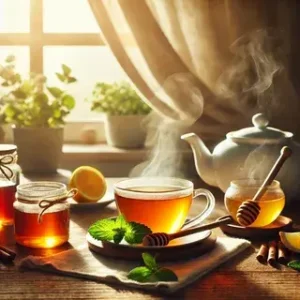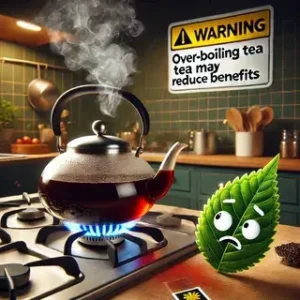If someone were ever to ask me what I would suggest they drink, I could recommend raspberry tea all the time. There are cherries, nutritional value, there are cherries, and there is healthy raspberry tea, which stands out the most in his herbal tea collection. From the antioxidant properties of this drink to its mild protein in the stomach and improvement of health for women, everything is present in raspberry tea for enjoyment. If you’re searching for a new herbal tea to taste or would like to incorporate one healthy drink alone into your everyday practice, I would strongly recommend raspberry tea.
On the up-side, raspberry tea is another healthy drink that most diets may include, however, one has to be mindful of how they feel and seek medical guidance in case of any medical conditions. Enjoy your tea journey, and here’s to great health, one cup at a time!
What Is Raspberry Tea?
When I first heard of tea raspberry, I assumed it was just about the fruit, but raspberry tea has two varieties. The product can either be prepared using raspberry leaves or using the fruit itself, which offers different flavors and advantages for the user:
- Raspberry Leaf Tea: This is a tea prepared from the Raspberry plant’s dried leaves. Raspberry plant leaves have an earthy and green tea-like flavor and are well known for their use in traditional medicine, especially in gynecology.
- Raspberry Fruit Tea: Raspberry-flavored teas made with dried or fresh raspberries have a slightly sweet and tangy taste. It is usually more fruity than this, and I love it both warm or cold, depending on my mood and the season.
Many raspberry teas have special characteristics, and both are well-known in the herbal tea industry.
How to Make Raspberry Tea
I have discovered that preparing tea raspberry at home is super simple and seems to depend on the ingredients available. Here’s how I prepared both of them:
Raspberry Leaf Tea
- Ingredients:
- 1-2 teaspoons of dried raspberry leaves
- 1 cup of boiling water
- Honey, lemon, or a sweetener if desired
- Instructions:
- Place the dried leaves in a tea infuser or your teapot.
- Pour boiling water over the leaves and let it steep for 5-10 minutes.
- Strain the leaves, add honey or lemon to taste if you like, and enjoy.
Raspberry Fruit Tea
- Ingredients:
- 1 cup of fresh or frozen raspberries
- 2 cups of water
- Honey or another sweetener (optional)
- Instructions:
- Bring the water and raspberries to a boil in a small pot.
- Lower the heat and simmer for about 10 minutes, allowing the berries to infuse into the water.
- Strain out the raspberry pieces, add sweetener if desired, and drink it hot or let it cool for iced raspberry tea.
I love using fresh raspberries when they’re in season, but frozen ones work beautifully too!
What Are the Benefits of Raspberry Tea?
Regularly consuming raspberry tea has increased my appreciation for its health benefits. This tea is a great choice for health and wellness for the following reasons:
Rich in Antioxidants
Cell protection is aided by antioxidants present in raspberry tea. Flavonoids and polyphenols, for example, are powerful antioxidants that help reduce inflammation and work to keep the immune system healthy.
Supports Women’s Health
Raspberry leaf tea is known to offer women reproductive benefits, and this has been the case in many cultures over the years. For centuries, it has been taken to strengthen the uterine walls, suppress menstrual pains, and help during labor and childbirth in general. As someone who values natural wellness, I find this aspect of raspberry leaf tea to be outstanding.
Boosts the Immune System
Raspberry fruit tea, especially, contains vitamin C, which supports immune health. A cup of raspberry tea provides a tasty way to get a bit of extra vitamin C.
Aids Digestion
The mild astringent properties of raspberry tea make it soothing for the stomach. If I’m ever feeling Also, after feeling a bit full or uneasy after a meal, a hot cup of raspberry tea helps to reduce the feeling.
Hydrating and Low in Calories
Raspberry tea, aside from being a healthful drink with low calories available for all sugar-wary individuals or those wishing to abstain or cut down on their caffeinated drinks, is a flavourful and satisfying tea that quenches thirst. I usually advise it to my friends since it is way more healthy and tasty than soda or sweetened juices.
Is It OK to Drink Raspberry Tea Every Day?
Raspberry tea is, in my opinion, something that can be consumed every day without any health concerns, but rather with health benefits. Hence, I have integrated it into my daily activities and habits:
- Supports Hydration: Herbal preparations, raspberry tea included, do not contain caffeine which makes them perfect for taking liquids. As diligent as I am about nutrition, it is good that all tea is served without caffeine.
- Low in Calories: Again, I am conscious of what I eat most of the time so if calorie count is to be regarded, raspberry tea is acceptable as it has very few calories. It serves the purpose most times when I do not want to stick to plain water or I would want something nice and cheap in calories.
- Health Benefits: As discussed above, raspberry tea has benefits such as immune boosting, aiding the digestive system, and even reproductive health benefits for women, when consumed regularly. That daily doses help me to have access to these advantages all the time.
Nevertheless, it is always important to speak to a doctor any time one is expecting, breastfeeding, or has any underlying illnesses. Especially, raspberry leaf tea has been used by many women during pregnancy over the centuries, but it is best to seek advice as to how much of it is appropriate for you.
Raspberry Tea vs. Other Herbal Teas
Raspberry tea, like other herbal teas, creates additional herbal suspicions to the drinker and this is one of the frequent questions that I have been asked. Here’s a quick comparison from my perspective:
- Raspberry Tea vs. Chamomile Tea: Chamomile tea is well-known for its calming effects, while raspberry tea is more focused on immune and reproductive health benefits. If I’m looking to relax, I’ll go for chamomile; if I’m aiming for antioxidant benefits, I reach for raspberry.
- Raspberry Tea vs. Peppermint Tea: When I have stomach upsets and trouble solving the stomach, I drink raspberry and peppermint teas. Raspberry tea is less intense than peppermint but I think it is just as sweet, if not a little more.
- Raspberry Tea vs. Hibiscus Tea: Apart from the fact that both drinks have great levels of antioxidants, there is also a contrast in the flavor of both drinks since hibiscus tea is slightly sour and intense red. I love drinking hibiscus herbal tea for its restorative properties, whereas raspberry tea is reserved for those days when I do not feel like having such an intense berry tartness.
Every herbal tea offers something different and I enjoy having different available for different health concerns or moods.
Is Raspberry Tea Good for the Skin?
While enjoying raspberry tea, I have come to loathe cuts and bruises as they take way too long to heal. One of the reasons is:
- Antioxidant Power: Raspberry tea contains antioxidants that control oxidative stress which is a major factor in skin elastosis. These antioxidants also act to prevent free radical damage to the skin thus skin remains looking young and fresh.
- Vitamin C Boost: Raspberry fruit tea is also rich in Vitamin C, which is necessary in making collagen. Collagen is a protein that retains skin elasticity and firmness. That is why drinking raspberry tea works for me and helps my skin from the inside.
- Hydration: It’s very important to keep moist yourself and raspberry tea does the same adding a tasty twist. In case my skin has that dry sensation, I normally take Raspberry tea as one of the drinks in my hydration package.
What is raspberry tea good for?
- Answer: It is often known that raspberry tea is very beneficial for women and offers numerous health advantages. This tea is used to relieve menstrual pain and support the healthy operation of female organs since it is high in antioxidants and is thought to help regulate hormones. With no caffeine, raspberry tea has a somewhat energizing impact, strengthens the body’s natural defenses, and helps the gastrointestinal tract. The presence of vitamins C and E in this tea’s structure makes it a useful treatment for general health.
2. Is raspberry tea the same as raspberry leaf tea?
- Answer: No, Raspberry leaf tea is not the same as raspberry tea. While raspberry leaf tea is made from the leaves of the raspberry bush and has a medicinal taste, raspberry tea is typically made from the berries of the raspberry bush, giving it the fruit flavor. Pregnant women particularly enjoy the health benefits of raspberry leaf tea, which are attributed to phytonutrients in the leaves that are absent from the fruit.
3. Who should not drink raspberry leaf tea?
- Answer: In general, most people can safely drink raspberry leaf tea, but some people might not be able to. Because it may cause the uterus to contract, pregnant women should see a certified medical professional before taking it, especially in the first few weeks of pregnancy. In addition, as raspberry leaf tea can be mildly hypertensive and alter hormone levels, people with hormone-dependent conditions or those using blood pressure medicine are advised to consult a doctor. Additionally, people who are allergic to the rose family of plants might want to avoid using it.
4. Is raspberry tea the same as raspberry leaf tea?
Answer: No, There is a difference between tea raspberry and raspberry leaf tea. First, raspberry leaf tea is created from the tender, slightly more herbal-tasting leaves of the raspberry bushes, whereas raspberry tea is made from the sweet, slightly sour raspberry fruits. The health benefits also differ: raspberry tea is primarily consumed for its pleasant flavor and antioxidants, whereas raspberry leaf tea is primarily utilized for its nutritional value and especially for its role in supporting reproductive health.
When is the best time to drink raspberry tea?
- Since tea raspberry doesn’t contain caffeine, it can be had at any time of day. Because of its relaxing properties, some individuals prefer to drink raspberry leaf tea in the evening, particularly if they are using it to relieve menstruation cramps.
How does raspberry tea benefit women’s health?
- Because it may help tone the uterus, improve menstrual health, and reduce symptoms like cramping or heavy flow, raspberry leaf tea is especially good for women’s health. Additionally, some pregnant women find it useful in getting ready for labor (see a doctor before using).
Can raspberry tea help with cramps?
- Yes, Because raspberry leaf tea has the ability to relax muscles and lessen cramping, it is frequently used to assist treat menstrual cramps. It contains substances that could provide extra relief by balancing hormones.
Is raspberry leaf tea good for hormonal balance?
- Raspberry leaf tea is popular among women who are suffering from menopause or PMS symptoms because it includes natural ingredients that may help balance hormones. It shouldn’t, however, be the only treatment for hormonal problems.
What does raspberry tea taste like?
- While raspberry leaf tea tastes more herbal and earthy, raspberry tea brewed from berries has a delicious, slightly acidic flavor. Although they both taste good, their consequences on health are different.
Is it safe to drink raspberry tea every day?
- Moderate amounts of tea raspberry or raspberry leaf tea can be safely consumed every day by most people. However, anyone with specific medical issues and pregnant women, particularly those in the early stages of pregnancy, should consult a healthcare professional first.
Does tea raspberry help with fertility?
- In some traditional practices, raspberry leaf tea is used to promote reproductive health and fertility. It might help strengthen the lining of the uterus, but more research is required, and it’s better to speak with a healthcare professional.
Additional FAQs for Raspberry Tea Article
- Does raspberry tea help with weight loss?
- Like many herbal teas, tea raspberry may aid with weight management by reducing cravings and slightly increasing metabolism. Although it isn’t a miracle weight-loss trick, it might be a good complement to a healthy diet.
- Can tea raspberry induce labor?
- In order to help tone the uterus in preparation for labor, raspberry leaf tea—not raspberry tea produced from berries—is occasionally advised in the latter stages of pregnancy. However, as it might not be appropriate for everyone, it is imperative to speak with a healthcare professional before using it.
- How often can you drink raspberry leaf tea?
- One to three cups of raspberry leaf tea per day is deemed safe for the majority of people. If you are pregnant, nursing, or have any medical issues that can affect the tea, it is best to speak with a healthcare professional.
- Is tea raspberry safe for children?
- In moderation, youngsters can safely drink tea raspberry produced from berries. However, because of its unique health effects, raspberry leaf tea might not be appropriate for young children and should only be administered after speaking with a healthcare professional.
- Does raspberry tea have caffeine?
- No, Because tea raspberry and raspberry leaf tea are inherently caffeine-free, they are appropriate for those who are trying to cut back on caffeine or who want a soothing herbal alternative.
- Can raspberry tea help with skin health?
- Yes, Antioxidants, especially vitamin C, found in raspberry tea can help protect skin health by scavenging free radicals and encouraging a radiant complexion. Additionally, it might lessen inflammation, which is good for the health of the skin as a whole.




